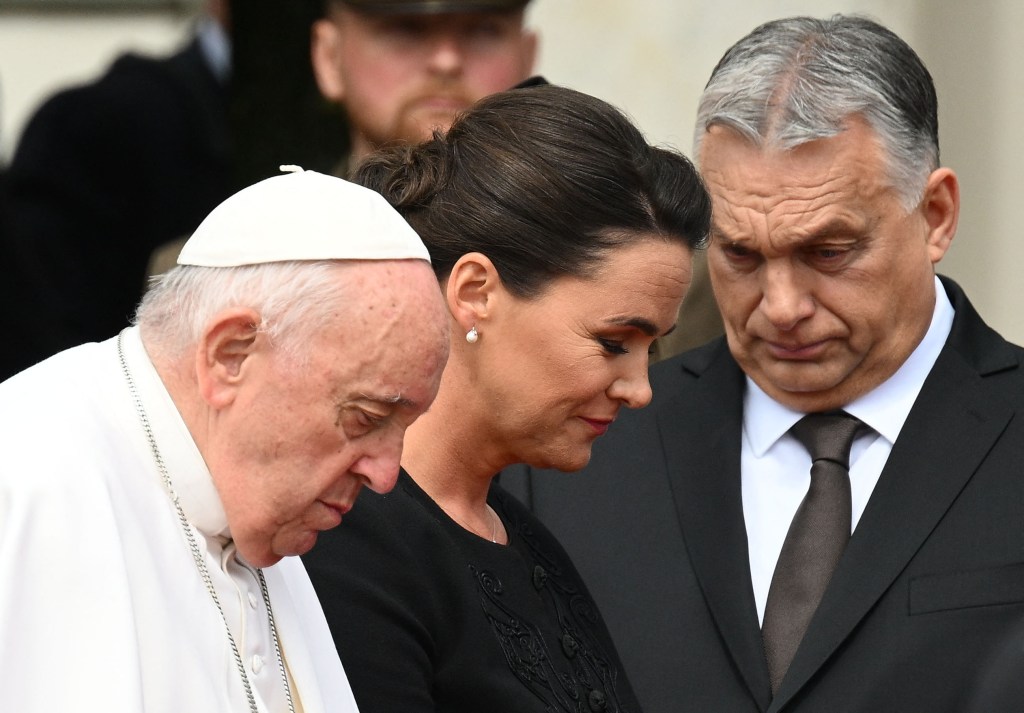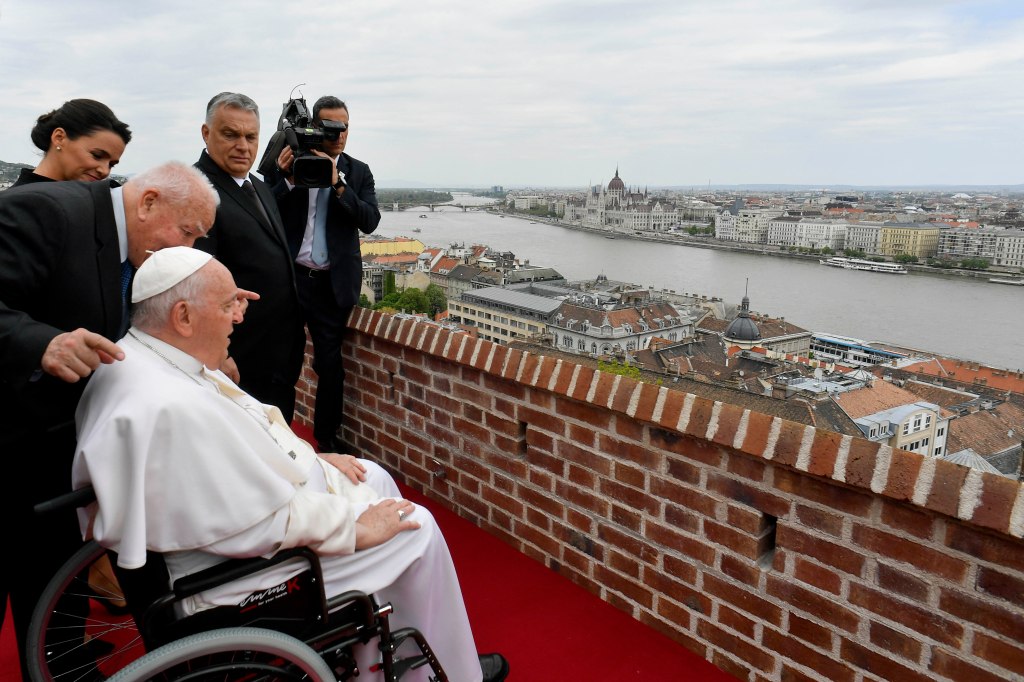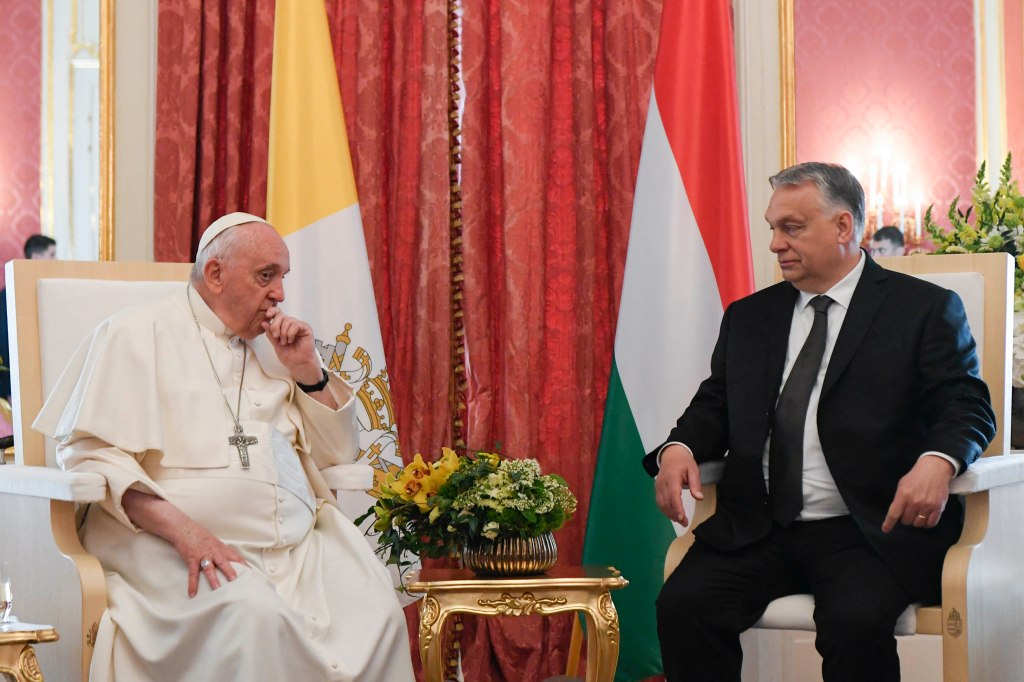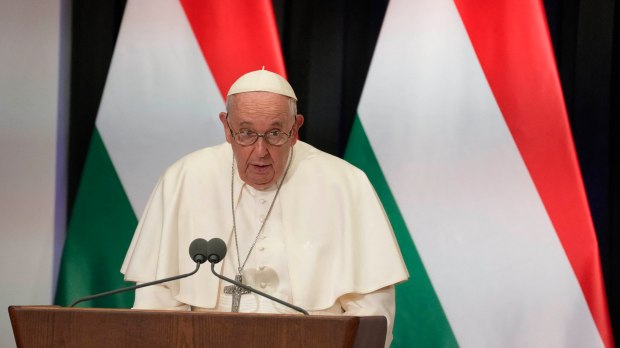“Where are creative efforts for peace” in Ukraine? Pope Francis asked in his speech to the Hungarian authorities, his first since arriving in Budapest on April 28, 2023. The 86-year-old Pontiff seemed to encourage Hungary’s currently isolated choice of action, as it advocates for a diplomatic resolution to the war between Russia and Ukraine.
While hailing Hungary for its family policies in a Europe where some promote “gender theory” or abortion, Pope Francis also denounced “self-referential forms of populism” and stressed the need to welcome migrants.
Pope Francis stood and spoke for 20 minutes before the country’s authorities and diplomatic corps, as they were gathered in a former Carmelite monastery that today houses the government in the heart of the Hungarian capital. Before his speech he had met behind closed doors the President of the Hungarian Republic, Katalin Novák, for 25 minutes, and then the Hungarian Prime Minister, Viktor Orbán, for 20 minutes.

It has been more than a year since Russian troops invaded Ukraine and prospects for peace are non-existent, as Kyiv is preparing to carry out a counter-offensive in the spring. It is within this context that Pope Francis chose to call on European consciences from Budapest.
According to the Pontiff, this city, which has experienced “Nazi and Communist dictatorships,” carries the “mission to preserve the treasure of democracy and the dream of peace.”
“The birth of this great capital in the heart of the continent invites us to reflect on the process of unification undertaken by Europe, in which Hungary plays a vital role,” Francis said. “We seem to be witnessing the sorry sunset of that choral dream of peace, as the soloists of war now take over.”
Europe needs to recover its spirit and be united
The head of the Catholic Church in fact warned that “peace will never come as the result of the pursuit of individual strategic interests.”
He also stressed that at this “historical juncture” it is “vital to recover the European spirit: the excitement and vision of its founders, who were statesman able to look beyond their own times, beyond national boundaries and immediate needs, and to generate forms of diplomacy capable of pursuing unity, not aggravating divisions.”
Drawing a parallel between the “remarkable variety” of Budapest’s more than 20 districts and “the Europe of the 27” nations, which make up the European Union, the Pope reiterated that this entity, “built to create bridges between nations, requires the contribution of all, while not diminishing the uniqueness of each.”
Since the beginning of the war in Ukraine, Hungary has advocated for stopping the fighting and finding a resolution to the conflict through conciliation. Viktor Orbán’s government has refused to send or finance arms to Ukraine, an attitude criticized by other EU member states.
Before speaking, Pope Francis listened to the appeal of President Katalin Novák. “Here in Budapest, we ask you to intercede personally for a just peace as soon as possible,” she said. “We mothers want to first of all win peace, not war. We do not want to send our sons and husbands to the front.”
The president urged the Pope to speak “with Kyiv and Moscow, with Washington, Brussels, Budapest and with all those without whom there can be no peace.”

The Pope condemns the “senseless ‘right to abortion’”
Pope Francis condemned certain currents and ideologies in Europe that move the focus away from the human person and the country’s peoples. He called for the continent to not be “hostage to its parts, neither falling prey to self-referential forms of populism nor resorting to a fluid, if not vapid, ‘supranationalism’ that loses sight of the life of its peoples.”
“This is the baneful path taken by those forms of ‘ideological colonization’ that would cancel differences, as in the case of the so-called gender theory, or that would place before the reality of life reductive concepts of freedom, for example by vaunting as progress a senseless ‘right to abortion,’ which is always a tragic defeat,” the Pontiff continued.
Francis praised the fact that Hungary “attentively” pursues policies that are “effective for the natality and the family.” This central European country is regularly singled out by other member states of the European Union, as in September 2022, when a Hungarian decree tightened the law on abortion.

Europe must build “secure and legal corridors” for migrants
Pope Francis also reminded the country’s authorities of the need to take care of the most disadvantaged, especially migrants. This was a subject of discord between the Pontiff and the head of the Hungarian government during the Balkan migration crisis in the mid-2010s.
Citing the country’s constitution, which states they ” have a general duty to protect the vulnerable and the poor,” Pope Francis also invoked St. Stephen, the father of the Hungarian nation. He wrote “a country that has but one language and custom is weak and fragile; for this reason I urge you to welcome strangers with benevolence and to hold them in esteem, so that they prefer to be with you rather than elsewhere.”
“The issue of acceptance and welcome is a heated one in our time, and is surely complex,” the Pope acknowledged, while urging his interlocutors “to confront the problem without excuses and delay.”
“It needs to be confronted together, as a community, not least because, in the present situation, its effects will be felt, sooner or later, by all of us. It is urgent then, as Europe, to work for secure and legal corridors and established processes for meeting an epochal challenge that is ineluctable and needs to be acknowledged, in order to prepare a future that, unless it is shared, will not exist,” the Pope explained.
The rest of the day’s program
After this speech, the first of five that Pope Francis will pronounce in Hungary, the head of the Catholic Church was taken to the Apostolic Nunciature in Budapest. He will be staying there until he returns to Rome on Sunday.
Only one event is on the agenda for Friday afternoon: at 5 p.m. the Pope will pronounce his second speech of the day in a meeting with bishops, priests, deacons, consecrated persons, seminarians and pastoral agents in St. Stephen’s co-cathedral.
Pope Francis had already delivered an address to the bishops of Hungary in 2021, before the closing Mass of the International Eucharistic Congress.

